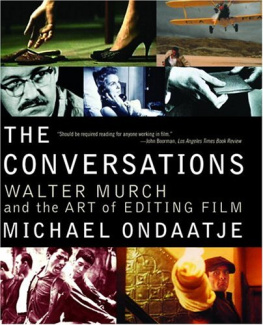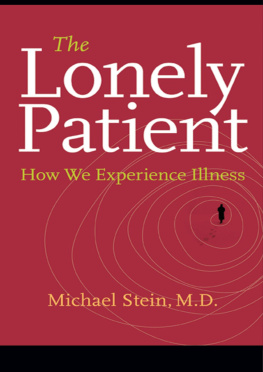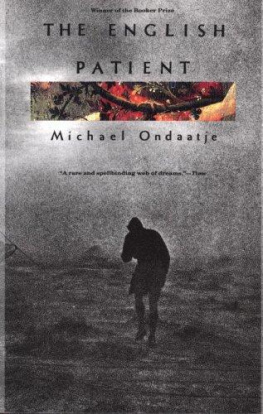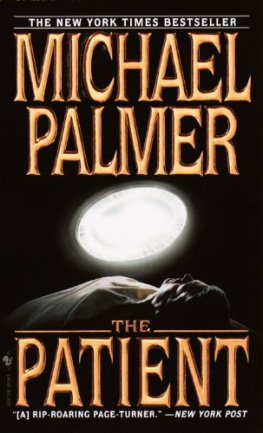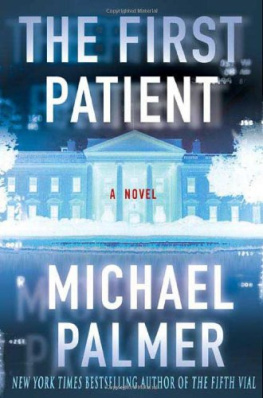Michael Ondaatje - The English Patient
Here you can read online Michael Ondaatje - The English Patient full text of the book (entire story) in english for free. Download pdf and epub, get meaning, cover and reviews about this ebook. year: 1992, publisher: Bloomsbury, genre: Art. Description of the work, (preface) as well as reviews are available. Best literature library LitArk.com created for fans of good reading and offers a wide selection of genres:
Romance novel
Science fiction
Adventure
Detective
Science
History
Home and family
Prose
Art
Politics
Computer
Non-fiction
Religion
Business
Children
Humor
Choose a favorite category and find really read worthwhile books. Enjoy immersion in the world of imagination, feel the emotions of the characters or learn something new for yourself, make an fascinating discovery.

- Book:The English Patient
- Author:
- Publisher:Bloomsbury
- Genre:
- Year:1992
- Rating:3 / 5
- Favourites:Add to favourites
- Your mark:
- 60
- 1
- 2
- 3
- 4
- 5
The English Patient: summary, description and annotation
We offer to read an annotation, description, summary or preface (depends on what the author of the book "The English Patient" wrote himself). If you haven't found the necessary information about the book — write in the comments, we will try to find it.
The English Patient — read online for free the complete book (whole text) full work
Below is the text of the book, divided by pages. System saving the place of the last page read, allows you to conveniently read the book "The English Patient" online for free, without having to search again every time where you left off. Put a bookmark, and you can go to the page where you finished reading at any time.
Font size:
Interval:
Bookmark:

Michael Ondaatje

In memory of
Skip and Mary Dickinson
For Quintin and Griffin
And for Louise Dennys,
with thanks
Most of you, I am sure, remember the tragic circumstances of the death of Geoffrey Clifton at Gilf Kebir, followed later by the disappearance of his wife, Katharine Clifton, which took place during the 1939 desert expedition in search of Zerzura.
I cannot begin this meeting tonight without referring very sympathetically to those tragic occurrences.
The lecture this evening
From the minutes of the
Geographical Society meeting
of November 194, London
The Villa
She stands up in the garden where she has been working and looks into the distance. She has sensed a shift in the weather. There is another gust of wind, a buckle of noise in the air, and the tall cypresses sway. She turns and moves uphill towards the house, climbing over a low wall, feeling the first drops of rain on her bare arms. She crosses the loggia and quickly enters the house.
In the kitchen she doesnt pause but goes through it and climbs the stairs which are in darkness and then continues along the long hall, at the end of which is a wedge of light from an open door.
She turns into the room which is another garden this one made up of trees and bowers painted over its walls and ceiling. The man lies on the bed, his body exposed to the breeze, and he turns his head slowly towards her as she enters.
Every four days she washes his black body, beginning at the destroyed feet. She wets a washcloth and holding it above his ankles squeezes the water onto him, looking up as he murmurs, seeing his smile. Above the shins the burns are worst. Beyond purple. Bone.
She has nursed him for months and she knows the body well, the penis sleeping like a sea horse, the thin tight hips. Hipbones of Christ, she thinks. He is her despairing saint. He lies flat on his back, no pillow, looking up at the foliage painted onto the ceiling, its canopy of branches, and above that, blue sky.
She pours calamine in stripes across his chest where he is less burned, where she can touch him. She loves the hollow below the lowest rib, its cliff of skin. Reaching his shoulders she blows cool air onto his neck, and he mutters.
What? she asks, coming out of her concentration.
He turns his dark face with its grey eyes towards her. She puts her hand into her pocket. She unskins the plum with her teeth, withdraws the stone and passes the flesh of the fruit into his mouth.
He whispers again, dragging the listening heart of the young nurse beside him to wherever his mind is, into that well of memory he kept plunging into during those months before he died.
There are stories the man recites quietly into the room which slip from level to level like a hawk. He wakes in the painted arbour that surrounds him with its spilling flowers, arms of great trees. He remembers picnics, a woman who kissed parts of his body that now are burned into the colour of aubergine.
I have spent weeks in the desert, forgetting to look at the moon, he says, as a married man may spend days never looking into the face of his wife. These are not sins of omission but signs of preoccupation.
His eyes lock onto the young womans face. If she moves her head, his stare will travel alongside her into the wall. She leans forward. How were you burned?
It is late afternoon. His hands play with a piece of sheet, the back of his fingers caressing it.
I fell burning into the desert.
They found my body and made me a boat of sticks and dragged me across the desert. We were in the Sand Sea, now and then crossing dry riverbeds. Nomads, you see. Bedouin. I flew down and the sand itself caught fire. They saw me stand up naked out of it. The leather helmet on my head in flames. They strapped me onto a cradle, a carcass boat, and feet thudded along as they ran with me. I had broken the spareness of the desert.
The Bedouin knew about fire. They knew about planes that since 1939 had been falling out of the sky. Some of their tools and utensils were made from the metal of crashed planes and tanks. It was the time of the war in heaven. They could recognize the drone of a wounded plane, they knew how to pick their way through such shipwrecks. A small bolt from a cockpit became jewellery. I was perhaps the first one to stand up alive out of a burning machine. A man whose head was on fire. They didnt know my name. I didnt know their tribe.
Who are you?
I dont know. You keep asking me.
You said you were English.
At night he is never tired enough to sleep. She reads to him from whatever book she is able to find in the library downstairs. The candle flickers over the page and over the young nurses talking face, barely revealing at this hour the trees and vista that decorate the walls. He listens to her, swallowing her words like water.
If it is cold she moves carefully into the bed and lies beside him. She can place no weight upon him without giving him pain, not even her thin wrist.
Sometimes at two a.m. he is not yet asleep, his eyes open in the darkness.
He could smell the oasis before he saw it. The liquid in the air. The rustle of things. Palms and bridles. The banging of tin cans whose deep pitch revealed they were full of water.
They poured oil onto large pieces of soft cloth and placed them on him. He was anointed.
He could sense the one silent man who always remained beside him, the flavour of his breath when he bent down to unwrap him every twenty-four hours at nightfall, to examine his skin in the dark.
Unclothed he was once again the man naked beside the blazing aircraft. They spread the layers of grey felt over him. What great nation had found him, he wondered. What country invented such soft dates to be chewed by the man beside him and then passed from that mouth into his. During this time with these people, he could not remember where he was from. He could have been, for all he knew, the enemy he had been fighting from the air.
Later, at the hospital in Pisa, he thought he saw beside him the face that had come each night and chewed and softened the dates and passed them down into his mouth.
There was no colour during those nights. No speech or song. The Bedouin silenced themselves when he was awake. He was on an altar of hammock and he imagined in his vanity hundreds of them around him and there may have been just two who had found him, plucked the antlered hat of fire from his head. Those two he knew only by the taste of saliva that entered him along with the date or by the sound of their feet running.
She would sit and read, the book under the waver of light. She would glance now and then down the hall of the villa that had been a war hospital, where she had lived with the other nurses before they had all transferred out gradually, the war moving north, the war almost over.
This was the time in her life that she fell upon books as the only door out of her cell. They became half her world. She sat at the night table, hunched over, reading of the young boy in India who learned to memorize diverse jewels and objects on a tray, tossed from teacher to teacher those who taught him dialect those who taught him memory those who taught him to escape the hypnotic.
The book lay on her lap. She realized that for more than five minutes she had been looking at the porousness of the paper, the crease at the corner of page 17 which someone had folded over as a mark. She brushed her hand over its skin. A scurry in her mind like a mouse in the ceiling, a moth on the night window. She looked down the hall, though there was no one else living there now, no one except the English patient and herself in the Villa San Girolamo. She had enough vegetables planted in the bombed-out orchard above the house for them to survive, a man coming now and then from the town with whom she would trade soap and sheets and whatever there was left in this war hospital for other essentials. Some beans, some meats. The man had left her two bottles of wine, and each night after she had lain with the Englishman and he was asleep, she would ceremoniously pour herself a small beaker and carry it back to the night table just outside the three-quarter-closed door and sip away further into whatever book she was reading.
Font size:
Interval:
Bookmark:
Similar books «The English Patient»
Look at similar books to The English Patient. We have selected literature similar in name and meaning in the hope of providing readers with more options to find new, interesting, not yet read works.
Discussion, reviews of the book The English Patient and just readers' own opinions. Leave your comments, write what you think about the work, its meaning or the main characters. Specify what exactly you liked and what you didn't like, and why you think so.

